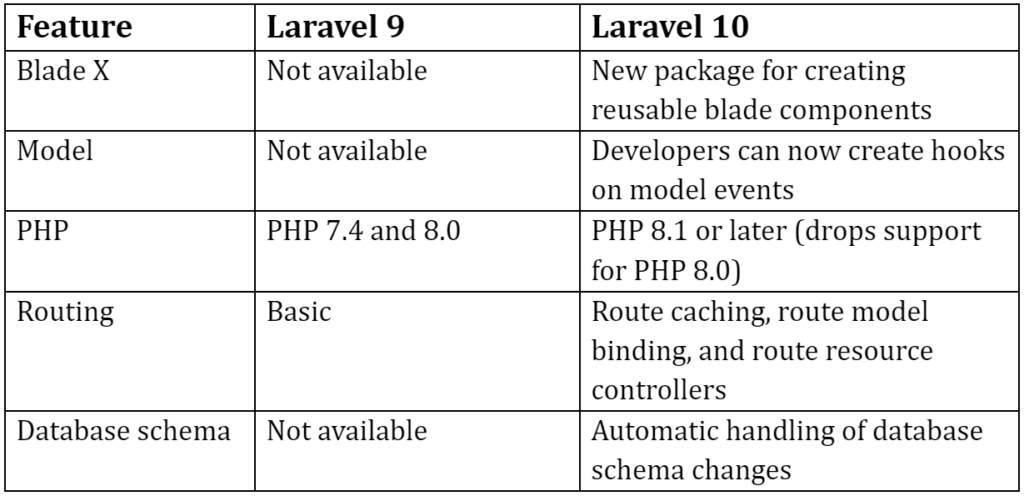Laravel is a PHP web application framework known for its expressive and elegant syntax that allows developers to create robust web applications. Laravel development provides a structural foundation for apps and it is one of the most widely used PHP frameworks worldwide, and its popularity continues to grow with each new release. In this article, we will explore the latest release of Laravel, version 10, and discuss its new features, improvements, and how it differs from Laravel 9.
What’s New in Laravel 10?
1. BladeX: Laravel 10 introduces a new package called BladeX, which provides an elegant way to create reusable blade components. This feature allows developers to create and reuse modular templates across multiple projects.
2. Model Event Hooks: With Laravel 10, developers can now create hooks on model events such as creating, updating, and deleting. This feature enables developers to perform additional actions when a model event occurs, such as sending emails or notifications.
3. PHP 8.1 Support: Laravel 10 now supports the latest version of PHP, PHP 8.1. This version includes several new features and performance improvements to help developers create faster and more efficient web applications.
4. Improved Routing: Laravel 10 has improved routing features that make it easier for developers to create clean and organized routes for their applications. The new routing features include route caching, model binding, and resource controllers.
Difference between Laravel 9 and Laravel 10
Laravel 9 was released in February 2022, and Laravel 10 was released in February 2023. The main difference between these two versions is the introduction of new features and improvements in Laravel 10.

Laravel 10 Says Goodbye to PHP 8.0
One significant change in Laravel 10 is removing support for PHP 8.0. This means developers who want to use Laravel 10 must upgrade their PHP version to PHP 8.1 or later. This decision was made because PHP 8.0 has reached its end-of-life and will no longer receive updates or security fixes.
Some major reasons for Laravel 10 dropping support for PHP 8.0 are:
- PHP 8.0 was released in November 2020, including several new features and improvements.
- Laravel 9 was released in February 2022 and supported PHP 8.0 but also PHP 7.4.
- Laravel 10 was released in February 2023 and drops support for PHP 8.0, meaning that developers must upgrade to PHP 8.1 or later to use Laravel 10.
- PHP 8.0 has reached its end and will no longer receive updates or security fixes, which means it is not a recommended version for web development.
- By dropping support for PHP 8.0, Laravel 10 can take advantage of the new features and performance improvements in PHP 8.1 and later versions.
- Upgrading to a newer version of PHP can provide significant performance benefits and security enhancements for web applications.
- It’s important for developers to keep their PHP versions up-to-date to ensure their applications are secure and running efficiently.
Conclusion
Laravel 10 is a significant release for the Laravel framework, and it comes with several new features and improvements that will help developers create more robust and efficient web applications. The introduction of BladeX, model event hooks, and improved routing features make it easier for developers to build modular and scalable applications. The dropping of PHP 8.0 support is also a significant decision that ensures that developers are using the latest version of PHP, which is more secure and efficient. As always, Laravel continues to evolve and innovate, making it an excellent choice for web development projects.
Have a project concept in mind? Let's collaborate and bring your vision to life!
Connect with us & let’s start the journey
Share this article

Get in touch
Kickstart your project
with a free discovery session
Describe your idea, we explore, advise, and provide a detailed plan.


























